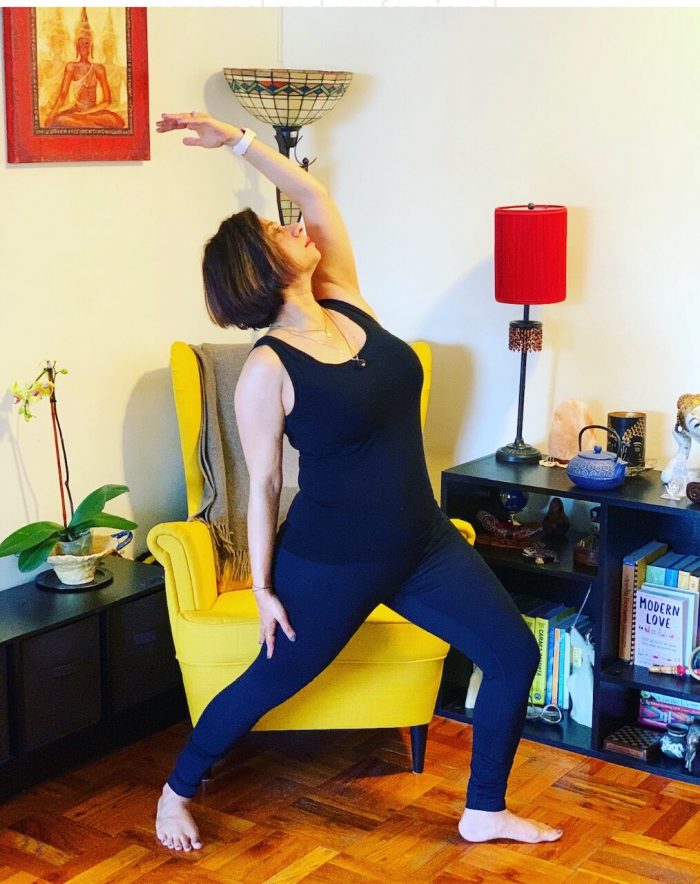Author’s note: Information in this article is presented for the sole purpose of imparting education on Ayurveda and the information isn’t intended to diagnose, treat, mitigate, cure, or prevent any disease. If you have a medical condition, or are pregnant or lactating, please consult a health professional. Before making changes to your diet or routine, it is recommended that you speak with your physician.
~
Did you know that over-exercising may be increasing both your sleeplessness and anxiety?
In life, and definitely during this time of the Coronavirus pandemic, we are frequently reminded to move our bodies.
We are told that exercise can lower anxiety, boost the immune system, keep the respiratory system strong, promote a positive mindset, sharpen memory, release endorphins (hello, happy hormones), lower insomnia, and help prevent diabetes, high cholesterol, and high blood pressure. The list of physical, mental, and emotional health benefits goes on.
Movement keeps us agile and young. It reminds us of the power and control we still have in our lives and over our bodies, despite the all the mayhem.
Exercising has been a part of my daily routine for as long as I can remember. Workouts have long been an outlet for me to channel any frustrations and anxiety, and that certainly hasn’t changed in these unprecedented times.
From taking nature walks or runs (while practicing social distancing) or practicing yoga and Pilates at home, to the thousands of online workout options being offered by gyms and fitness coaches for people to tune into from the comfort of their homes, there is no shortage of ways that we can indulge in physical activity.
But when the world went on pause, suddenly, our lifestyles changed. Life came to a standstill so abruptly that even we couldn’t even think of making a list for our food shopping.
As a rule, I never overstock, primarily because we live in an apartment and there is only so much space. Also, because I look forward to my weekend trip to Whole Foods, buying fresh produce, and preparing daily meals at the end of the work day. It’s part of my wellness regime and Ayurveda lifestyle philosophy.
From not being able to find grocery delivery slots on Fresh Direct, Amazon Fresh, or Instacart to the Indian grocery stores closing down business for a few weeks, like many others, we battled a new form of food insecurity. When we found a time slot to order groceries online and get them home delivered after many days of trying, several of the items weren’t available. We wanted to add more to the list to justify a person endangering their life to deliver food for us, but we also didn’t want to hoard out of compassion for others.
COVID-19 mutated our grocery list. Cookies, chips, soda, ice cream, cookies. Did I say cookies? Normally, I am the food matron at home, but given the circumstances, I too (momentarily) started to believe in comfort foods.
The first two weeks of remote working, social distancing, and quarantining at home, we spent facedown in lots of sugar, dairy, gluten, and everything else that you would never find in my pantry or refrigerator. We ate healthy meals, but we also didn’t shy away from sugar. How quickly the body makes a statement when you start to feed it junk regularly instead of reserving it as an occasional treat!
In my brain, there was this constant guilt about not treating my body right. But I listened to what my heart wanted. This wasn’t the time to be pragmatic. With everything else feeling so out of control—be it the uncertainty and stress of losing work, loved ones, or our own health—food was the one thing I felt I could rely on, aside from solid, personal relationships.
I started to exercise a lot more, yes, but I also love good food. So, when I stepped on the scale recently, it suggested that I add social distancing between myself and the refrigerator.
For me, it’s never been about being a certain size. I love being fit, eating healthy, and exercising daily as I see it impact my overall well-being: I sleep, think, work, and feel better. Wellness and mindfulness are at the core of everything I do. More importantly, I live with a chronic illness, and mindless eating is a violation of both my mind and body.
Ayurvedic “Balancing”
Ayurveda is and has almost always been my guiding light. So on week three, I accepted that we were going to be in this limbo for an extended period of time. I couldn’t afford to eat desserts like I was an 18-year-old on a backpacking trip. I began to again make decisions around what I was going to put in my body—both food and thoughts—based on my body type, season, and any imbalances.
I know, for example, that we are in kapha season, which is a combination of the earth and water elements. Kapha is slow, solid, dull, heavy, cold, soft, and oily. Ayurveda teaches us that like increases like, so I cut down on foods that increase kapha in the body—desserts, fried foods, gluten, and dairy. Portion control became my mantra, and I started to eat lighter meals, including salads. Note: While I love salads, I almost never eat raw foods because from an Ayurvedic perspective, they are harder to digest.
Ayurveda teaches us that opposites can bring balance. And the opposite of kapha in many ways is vata—a combination of the elements air and ether. Vata controls all movements in the body, both voluntary and involuntary. It includes, but is not limited to, energy and blood circulation, hormones, joint and muscular movement, and neuromuscular coordination. Vata also impacts our thoughts and emotions.
Unlike kapha, the vata dosha has the qualities of light, dry, and mobile. Cold is the quality vata has in common with kapha.
So, in an effort to balance kapha and vata, I increased the time I spent exercising.
Come rain, cold, wind, or thunderstorm, I hiked five miles daily. On some days after work, I started to go for two-hour walks (yes, while practicing social distancing and wearing a mask and pair of gloves) and practiced an hour of online yoga (my home studio went virtual). On Fridays and the weekend, if my schedule permitted, I practiced two hours of yoga. On my solitary walks, I plugged in my headphones and caught up with friends and family. I didn’t feel like I was disturbing anyone as I had a mask covering my mouth.
But inside of a week, I started to feel a difference in my temperament: the exposure to the cold and wind impacted my circulation. When others wore a hoodie on the trail, I had my ear muffs and a winter jacket on. The incessant chatting left me wired and wiped out. My lips felt chapped and my throat was perpetually parched. I was bloated and dehydrated most of the time. I also experienced aches and pains and tightness in my muscles. I started to wake up several times in the middle of the night, which is unusual for me. Because the quality of my sleep changed, I never felt rested when I woke up in the mornings. To remain productive at work, I increased my intake of caffeine, which elevates vata.
I saw my body transform into something I hadn’t seen before. Simultaneously, I felt immense fatigue. I don’t mean from juggling work, home, family, cooking, cleaning, planning a million meals, and food shopping. I mean tiredness in my bones—a lack of centeredness in my mind.
A friend confessed that she too had been experiencing similar symptoms. A drop in her workout performance. A disinterest in exercising. Moodiness. She felt scattered, anxious, sleepless, worried, sensitive to loud noises, constipated, nervous, fearful, and cold. We exchanged notes and realized that we had both traversed through a similar trajectory and ended up over-training, which was the reason for this mess.
The Effects of Over-Exercising
When we exercise too much, it can lead to hormonal imbalance.
Our body can interpret over-exercising as a stressor and raise levels of stress hormones like cortisol. Research tells us that over time, high cortisol levels will lead to increased storage of fat or adipose tissue. Cortisol also makes sleeping difficult. One Psychology Today article discusses the correlation between sleep deprivation and anxiety disorders. In Ayurveda speak, these are all signs of “vata-aggravation.”
Yes, it’s important to move your body daily. But we need to create a healthy and suitable exercise routine for our individual needs. Knowing when to pause and recuperate is just as important as knowing when to move our bodies so stagnation doesn’t set in, because exercise impacts how we feel and sleep.
“Exercise to stimulate, not to annihilate. The world wasn’t formed in a day, and neither were we. Set small goals and build upon them.” ~ Lee Haney









Read 1 comment and reply